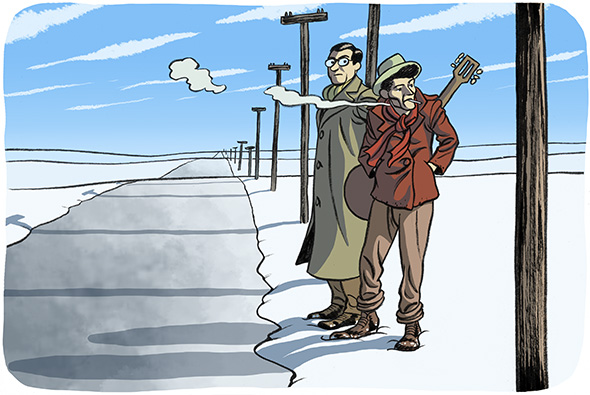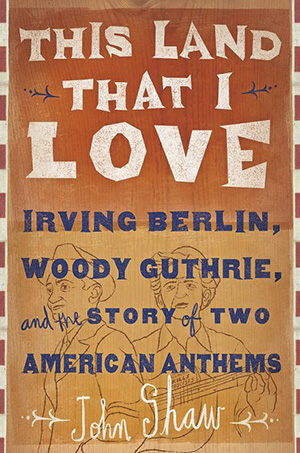
Slate is an Amazon affiliate and may receive a commission from purchases you make through our links.
God Blessed America
What happened when Irving Berlin pissed off Woody Guthrie.

Illustration by Frederik Peeters
John Shaw’s This Land That I Love begins in 1940, with a shot of Woody Guthrie trudging and hitching his way through a snowstorm, New York–bound from Pittsburgh. All along Guthrie’s route, Shaw writes, “jukeboxes and radios had blared ‘God Bless America,’ a hit for network radio star Kate Smith,” and that recording’s bludgeoning self-confident tone, reinforced by “a stirring march rhythm,” was really starting to piss Guthrie off.
Guthrie had battled his way through the Depression-torn 1930s, boots on the ground, from Texas to Los Angeles and all around the American West. What he’d seen during his hard travelin’—prejudice and hatred and violence, crowded labor camps, empty stomachs and hungry eyes—led him to conclude that heavenly endorsement was the last thing America had coming. Shaw aptly summarizes the reaction of the future folk-song hero to “God Bless America” like this: “A songbird bellowing ‘land that I love’ and rhapsodizing about her ‘home, sweet home’ provoked him.”
When Guthrie finally made it to Manhattan, he set to penning an answer song: “God Blessed America,” past tense. He had in mind both a mocking parody and an embittered rebuttal to Smith’s omnipresent hit. Think a Depression-era version of Rev. Jeremiah Wright’s infamous sermon—“No, no, no. Not ‘God Bless America.’ God damn, America”—except with sly humor, a stirring melody, and a catchy chorus that would encourage folks to stand up and sing along. He found the hook he needed in a 10-year-old Carter Family recording called “When the World’s on Fire” (a title right in line with his own estimation of the state of the union). As he worked on the song, though, the anger of his first draft was replaced, as was typical for Guthrie, with a vision of community and hope. As powerfully shown by the song’s original manuscript—reproduced in Shaw’s book—Guthrie drew a line through his first sarcastic pass at a concluding line for his chorus, “God blessed America for me,” and replaced it with a more generous and inclusive one: “This land was made for you and me.”
* * *
“God Bless America,” the anthem that so angered Guthrie and that inspired “This Land Is Your Land,” was written of course by Irving Berlin, the country’s best-known songwriter at the time and among the most accomplished, best-selling composers in American history. That kind of success was a world away from where he’d begun. As Shaw explains, the Berlins fled anti-Jewish pogroms in Siberia when Irving Berlin (née Israel Baline) was barely 5. They settled in the tenement slums of New York City where they endured a Lower East Side version of the desperate poverty Guthrie would witness nationwide three decades later.
Berlin climbed rung by rung up the show-business ladder—street busker to singing waiter, song-plugging striver to established Tin Pan Alley tunesmith. And then moved on up to a swanky deluxe address, paid for by such pop standards as “Alexander’s Ragtime Band,” “Blue Skies,” “Puttin’ on the Ritz,” “Cheek to Cheek,” “Heatwave,” “Easter Parade,” “I’ve Got My Love to Keep Me Warm,” and many more besides (and with “White Christmas,” probably the most commercially successful song in history, still to come).* It’s not enough to say that Berlin laid the cornerstone for that enduring pop cultural edifice, the Great American Songbook; he built the first several stories.
By 1938, when Kate Smith came to him seeking a special Armistice Day number for her radio show, Berlin was feeling thankful to have achieved so much from such desperate beginnings. He was reminded of a rousing patriotic number he’d written 20 years before but never published; after making revisions both big and small to that earlier version, he offered Smith “God Bless America.” “Berlin had written a love song,” Shaw explains. The assimilated Russian Jew imagined it as a quiet ballad of gratitude to the country he felt he owed so much, a personal and humble plea: “God bless, America, my home sweet, home.”
Kate Smith did her best to accommodate Berlin’s vision when she debuted the song on her radio program. “Quiet” and “humble,” however, were never Smith’s vocal strengths. When she recorded the song a few months later, Smith characteristically bellowed the song at the top of her considerable lungs. The arrangement’s brass boasted and made a fist; the strings swelled with belligerent pride; the pace was martial. The difference between Berlin’s motivation and Smith’s interpretation embodies the way a complex love of country can shrink to mere pride. The gulf between the song’s conception and its best-known execution reminds how easy, perhaps even inevitable, it is for patriotism to warp into nationalism, into the conviction that one’s country is not only beloved but better, deservingly blessed, and beyond criticism, let alone in need of it. Smith’s triumphalist reading was the one Woody Guthrie heard and hated, freezing his ass off and thumbing for a ride.
* * *
The origin stories of these two superhero American anthems are hardly breaking news. Even comparing and contrasting their stories for insights into the American experience, as Shaw does here, is nothing new. Former Slate music writer Jody Rosen, for example, twined the tale of Berlin and Guthrie’s flag wavers in a 2000 New York Times piece, “Two American Anthems, in Two American Voices.” Indeed, Shaw notes in his acknowledgements that Rosen encouraged him to expand the Guthrie treatment he had in mind to include Berlin as well.
And Shaw adds to the conversation in all sorts of helpful ways. He is particularly good at nailing down the melodic ancestors for these Great American Anthems and for tracing the various revisions Berlin and Guthrie made to their songs along the way. Shaw, citing Rosen, notes that Berlin found a tune for his opening line by recycling a bit of melody from a Jew-mocking 1906 vaudeville novelty “When Mose With His Nose Leads the Band.” And the song’s final line, “my home sweet home,” Shaw points out, is sung to the melody of a parlor song favorite with that phrase as its title. He explains how Berlin’s anthem borrows melodic features from a one-time Russian anthem, “God Save the Tsar,” itself inspired by the success of Britain’s “God Save the King.” Consciously or not, Berlin the immigrant wrote an anthem that exemplifies assimilation: Old World roots are joined to a quintessential New World parlor song and to a so-called “Hebe” number—absorbed and appropriated, then reinvented and repurposed—and it all adds up to … American.

Courtesy of Jeff Shaw
Likewise, Shaw walks us through the many changes Guthrie made to “This Land Is Your Land,” outlining the significant additions and subtle alterations he made to the song over the years. To the Carter Family’s melody—which they’d borrowed from the African-American gospel song “Rock of Ages”—Guthrie added allusions to Josh White’s and Langston Hughes’ “Freedom Road.” Over time he added whole new verses, one about a “relief office” that has Guthrie “wondering if this land was made for you and me,” and another, most famously, about “private property.” Traveling across our land, Guthrie sings of coming to a sign that tells him to keep out. “But on the other side, it didn’t say nothing,” Guthrie winks. “This land was made for you and me.” Guthrie’s anthem has something quite different to say regarding assimilation. It adds up to … American, yes, but not fully, not yet.
* * *
At times, This Land That I Love piles up insights so quickly it can be frustrating—they fly by in a blink. About the Carter Family, for example, Shaw writes: “Maybelle’s guitar pushed the rhythm, dropping the accents a hair’s breadth before the beats, creating a sense of urgency about life against which a singer’s stoicism had meaning.” That nails the sound and sense of the Carter Family’s music, how it works, better than anything I’ve read. But instead of spending another few hundred words on the point, teasing out tensions and providing examples, Shaw bolts to something else.
Much earlier, he writes:
Parlor songs have never gone out of fashion, outlasting the fads for new dance rhythms that have continually supplanted each other the last 150 years in an unbroken chain, from the waltz and the polka to hip-hop dancing.
That sentence reads like an abstract for a whole other book I’d rush to read. And ditto for Shaw’s thumbnail take, late in this volume, on why Berlin and Guthrie’s dueling anthems remain truly national, all these years later, and why nothing has yet emerged to replace them:
Berlin and Guthrie shared a midcentury balance of confidence without machismo, a stoicism born of deprivation, a toughness born of struggle, a steadiness that neither sought nor feared difficulty, tempered with a hope and optimism born of having survived hard time. Our patriotic songwriters who have followed them haven’t had that mix.
Then, almost before you have time to think, Wow, that’s really interesting, he’s off talking about a post-9/11 version of “God Bless America” by Celine Dion, “a latter-day Kate Smith, hugely popular, powerfully piped, mostly disliked by critics.”
Perhaps Shaw’s way of pinballing from here to there and back again is a weakness of his work—but more often than not, I experienced it as an approach in step with his subject. Just watch him bounce from “The Star-Spangled Banner” to the “Negro National Hymn” “Lift Every Voice and Sing” to “My Country ’Tis of Thee,” or from Frederick Douglas to Buffalo Bill to Marian Anderson to Louis Armstrong, or from Jim Crow to “I Have a Dream” to Bruce Springsteen and Pete Seeger performing at the inauguration of Barack Obama. It’s an epic itinerary, and there’s a cast of thousands. Just as Berlin’s “God Bless America” journeys in a single line “from the mountains to the prairies” and Guthrie’s “This Land Is Your Land” hikes with equal speed “from California to the New York island,” This Land That I Love traverses, in a relatively small number of pages, the whole canvas of America.
Correction, Dec. 10, 2013: This article originally omitted the word Me from the song title “I’ve Got My Love to Keep Me Warm.”
---
This Land That I Love: Irving Berlin, Woody Guthrie, and the Story of Two American Anthems by John Shaw. PublicAffairs.
See all the pieces in this month’s Slate Book Review.
Sign up for the Slate Book Review monthly newsletter.
